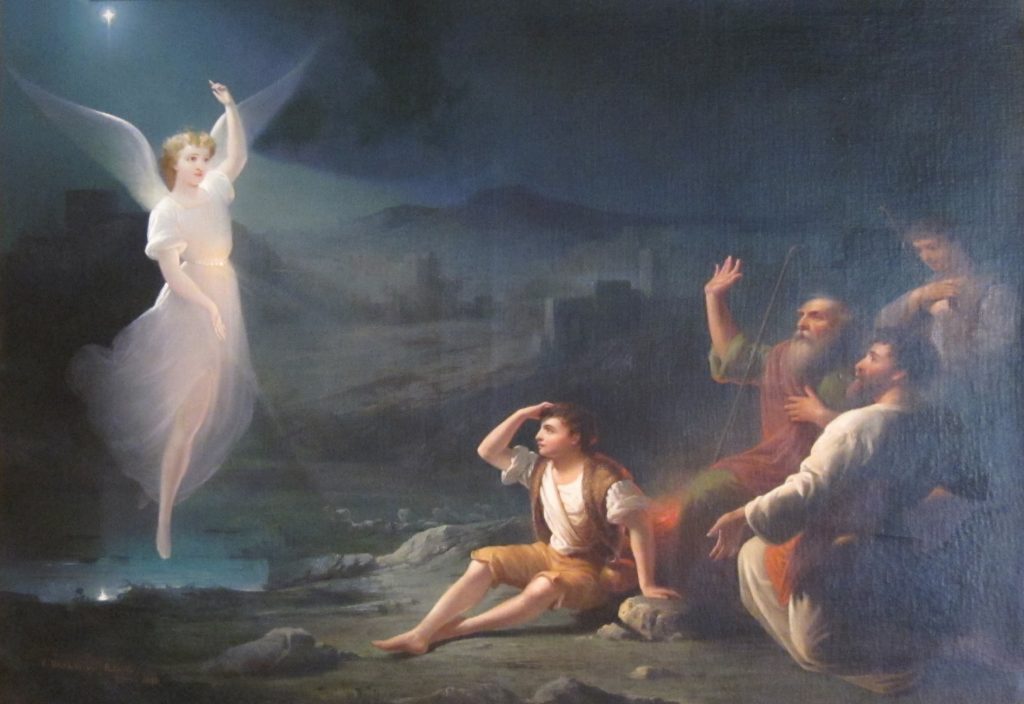
What was the last dramatic novel that you read? Was it a classic or pop fiction? Or perhaps, historical? Was it Biblical? Ah, you say, the Bible is not a novel! And you are right. But the Bible is one of the biggest dramas—particularly the Gospels. As we enter Advent, I would like to concentrate on the story of the Nativity, which, if read properly, should not only entertain you but shock you. Some of these things, you may know and understand already, but Scripture, to me, is always new.
Shocker #1 The Annunciation
What we read: The Angel Gabriel appeared to a young girl, Mary, and told her that she was to give birth to the Savior of the World.
What we should read: Let me try to put this in proper perspective. An Angel, that is, an immortal non-human creation of God whom the majority of us can barely imagine, appeared to Mary, a 13 or 14-year-old girl (barely a high school Freshman in our modern day standards). Try to wrap your head around that. Next, the Angel speaks to Mary and announces that she is to give birth to Jesus, the Messiah. Mary is still a child herself and only just became betrothed to Joseph, and now she must tell him she’s pregnant? By God? Oh, and the baby is supposed to save their entire Jewish nation. Not only that, but in those days, if an unmarried woman was found pregnant, she could be stoned to death! But instead of freaking out, like any normal teenage girl would and should do… she humbly accepts the mission she has been given and trusts God completely.
Shocker #2 The Census
What we read: Caesar Augustus calls a census and Joseph and Mary travel to Bethlehem to be enrolled.
What we should read: Mary is very close to giving birth as this point. And I don’t think most pregnant women relish the idea of traveling to a far city (about 90 miles) on foot or on the back of a donkey. Comfort level for pregnant women in either case—zero. But they must go, and she and Joseph must plan for the real possibility that Jesus will be born in Bethlehem and not at home.
Shocker #3 The Birth of Jesus
What we read: Mary and Joseph arrive in Bethlehem and Mary is about to give birth, but there is no room for them at the Inn, so Jesus is born in a stable.
What we should read: Joseph and Mary have come a long way only to find there is no comfortable place available for them to stay. Mary is in labor, and she will not have a bed on which to give birth. So Joseph and Mary are sent to a barn, and Mary gives birth on a bed of hay among farm animals and beasts of burden. The baby Jesus is placed in His first ‘cradle’, a manger, or feeding trough for the animals in the barn. The Savior, the Messiah, the Great I AM, is sleeping in a trough among the animals.
Shocker #4 The Shepherds
What we read: A group of shepherds were out watching their sheep when an Angel appeared to them and told them about the birth of Jesus. Then they traveled to Bethlehem to see Jesus.
What we should read: A group of dirty tired shepherds are out watching their flock at night, when suddenly the ‘glory of the Lord’ shone around them and an Angel appeared to them. It had to be pretty dark in the middle of whatever field these shepherds were—remember, no residual electric light from cities—so any light would be bright to them, but the light of God, I’m sure, was blinding and terrifying. Add to that, an Angel, who wishes to speak to them and tells them ‘Do not be afraid’! Right…
These are ordinary men—we are not even told their names—and they are shepherds, an occupation that was looked down upon by many, and these are the men that God chose to tell first. Not Herod, not Caesar, not even the Jewish High Priests—ordinary men, sinners, like us. And the Angel explains to them where Jesus is to be found, and then a ‘host’ of Angels sings the Gloria. A ‘host’ by definition is an ‘army’. So, imagine hundreds of heavenly beings singing God’s praises in the middle of a field to a few smelly working men. Starting to get the picture?
These same shepherds then travel to Bethlehem and find Jesus just as they were told. These men probably had no doubt that what the Angel told them was true at the time, but being human, doubt crept into their minds on the journey, and finding chubby little baby Jesus napping peacefully in a feeding trough was still a shock. Then they relay everything that happened to them to both Mary and Joseph, and they are filled with joy on the confirmation that this baby is, indeed, the Messiah! And what do they do? They return “glorifying and praising God”.
These shepherds are the true embodiment of how we are supposed to react to the story of the Nativity. They get it. They see, they hear, they believe, and then they evangelize. This is not some narrative that is simply repeated every year so we can hang lights, give gifts, and break out the egg nog. This baby, this child, this real person was born for us simple men, like those shepherds. He was born to save our souls so that we may one day join that heavenly host! This is not make believe or a fairy tale—this is real. This is history. A teenage girl gives birth in a dirty barn—real life drama. But it is not just drama—it is the Drama. It is the story of our Salvation!






Leave a Reply